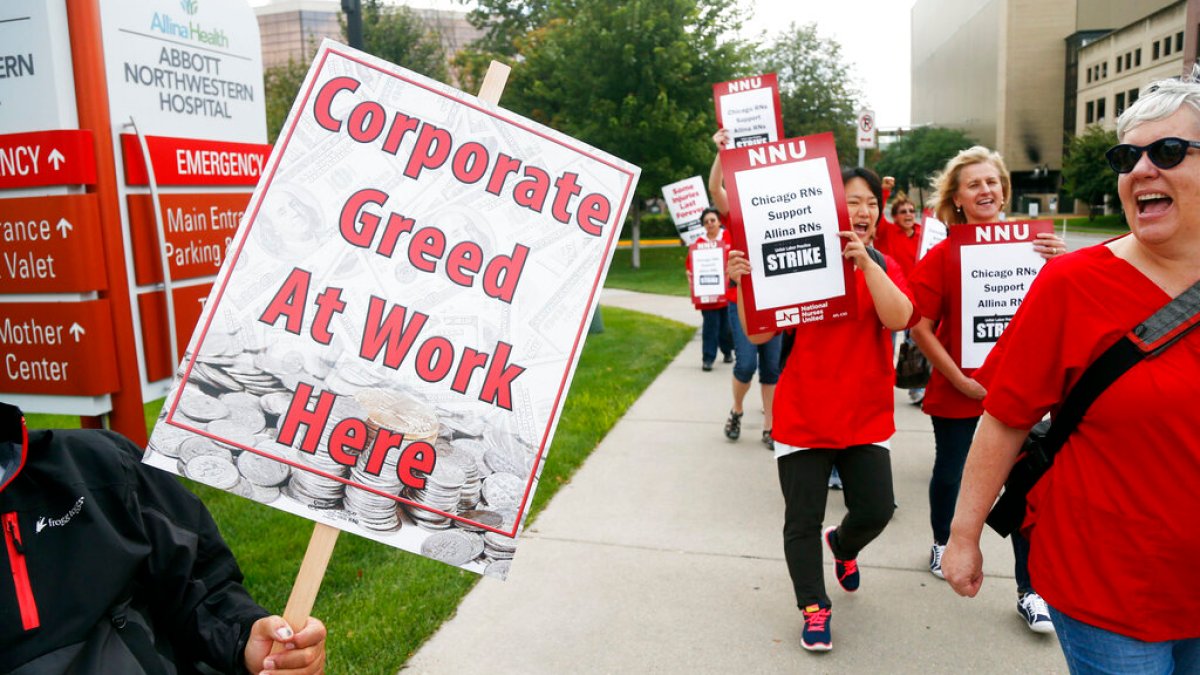
Approximately 15,000 private sector nurses in the US state of Minnesota have launched a three-day strike as they push for higher pay and better staffing in a healthcare system that has been stretched to its limits during the COVID-19 pandemic.
The nurses walked off the job on Monday in seven healthcare systems in Minneapolis and Duluth, mounting picket lines, chanting slogans and holding signs bearing messages such as “Patients Before Profits”.
The stoppage was set to last until Thursday morning, according to a spokesperson for the Minnesota Nurses Association (MNA), which was coordinating the action, and will affect 16 hospitals.
“Hospital executives have already driven nurses away from the bedside by their refusal to solve the crises of staffing and retention in our hospitals,” the union’s negotiating team said in a statement, adding that nurses are “understaffed and overworked”.
The strike, which the MNA said is believed to be the largest of its kind in United States history, highlights the persistent problems that US healthcare workers face, such as low pay and staffing shortages.
The pandemic has exacerbated many of those issues, and the sector has lost about 37,000 workers since February 2020, according to the US Bureau of Labor Statistics.
I stand in solidarity with the 15,000 @mnnurses on strike this week fighting for safer care, fair scheduling, and higher wages. Nurses are the backbone of our health care system. They understand what’s best for their patients. https://t.co/XHo3aqyiQy
— Bernie Sanders (@BernieSanders) September 12, 2022
The hospitals and the striking nurses have said staff shortages are an area of mutual concern, but the union has accused the management of dragging its feet during negotiations.
The union said it has spent more than five months trying to negotiate a new contract, and that nurses have been working without a contract for weeks.
The strike has caught the attention of pro-labour US lawmakers, such as Senator Bernie Sanders, who on Monday called nurses the “backbone of our healthcare system” and called for better wages and fairer scheduling.
The management has said the approximately 30 percent raise that nurses are pushing for is too high, and the hospitals have offered a 10-12 percent wage increase. In a statement, several hospitals affected by the strike called the demands “unrealistic, unreasonable and unaffordable”.
MNA president Mary Turned has said the raises are a vital component of addressing what she called a “crisis of retention” that could leave hospitals with severe staffing shortages.
Madi Gay, a second-year nurse who joined the picket line on Monday after completing an overnight shift, told the Star Tribune newspaper that she had already reduced her hours at M Health Fairview Southdale Hospital because of the stress brought about by the job.
“How long can you keep this up?” Gay asked.
Sam Fettig, a spokesperson for the union, said nurses decided on a three-day strike instead of a more open-ended one to ease the effect of the dispute on patient care.
“As the nurses always say, this isn’t something they want to be doing, they want to be at the bedside providing care,” Fettig said.
The affected hospitals have said temporary nurses will help maintain most services, albeit with possible disruptions.
North Memorial Health Hospital in Robbinsdale, Minnesota said it “may be making some adjustments to non-emergency care and services to ensure adequate and safe staffing during the strike period”.
But it stressed it will continue to offer its “full range of services” including inpatient, outpatient and emergency care, and that it would serve customers for any previously scheduled appointments.
Allina Health, which owns four hospitals with striking nurses, said on its website that it was making every effort to minimise disruptions.
Union activity has seen an uptick across the US, as workers push for better wages in a number of industries.
Some companies such as Starbucks have tried to undermine unionisation efforts, but more than 230 stores of the chain across the US have voted to unionise since late last year.
Meanwhile, the Biden administration has urged railroads and unions to reach a deal to avoid a railroad work stoppage later this week.
The railroads have until a minute after midnight on Friday to reach tentative deals with hold-out unions representing about 60,000 workers, which are pushing back on work rules that would require employees to be on-call and available to work most days.
“The parties continue to negotiate, and last night [Labor] Secretary [Marty] Walsh again engaged to push the parties to reach a resolution that averts any shutdown of our rail system,” a Labor Department spokesperson said. “All parties need to stay at the table, bargain in good faith to resolve outstanding issues, and come to an agreement.”
"low" - Google News
September 13, 2022 at 03:26AM
https://ift.tt/LQ85WKJ
‘Overworked’: US nurses strike over low pay, staffing shortages - Al Jazeera English
"low" - Google News
https://ift.tt/0Mk6fwg
Bagikan Berita Ini














0 Response to "‘Overworked’: US nurses strike over low pay, staffing shortages - Al Jazeera English"
Post a Comment